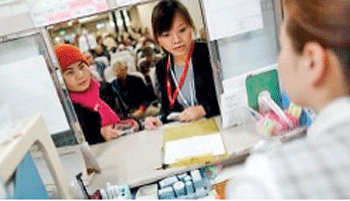Reply To:
Name - Reply Comment
Last Updated : 2024-04-20 00:00:00
 ‘Immigrants’ is a word more commonly heard in Japan in recent years. One reason for this is the need to respond to the country’s shrinking population. As of October 1, 2016, Japan’s total population was estimated to have dropped for the sixth straight year.
‘Immigrants’ is a word more commonly heard in Japan in recent years. One reason for this is the need to respond to the country’s shrinking population. As of October 1, 2016, Japan’s total population was estimated to have dropped for the sixth straight year.
The rate of population decline has also grown consecutively for each of those six years. The share of elderly people in Japan’s population is the highest in the world and is increasing at a pace seen nowhere else.
The National Institute of Population and Social Security Research (IPSS) estimates that in the year 2040, the total population of Japan will be 110.92 million compared with roughly 126 million today. Of this total, the productive population — those aged 15–64 — will account for 59.78 million and those aged 65 and over will account for 35.3 percent. The IPSS estimates that in 2065, these figures will be 88.08 million, 45.29 million and 38.4 percent, respectively.
It may be unrealistic to suggest that Japan ‘replace’ its declining population and labour shortage solely through migration. But if depopulation is set to harm Japanese society, it is only natural to start considering increasing immigration.
Since Prime Minister Shinzo Abe took back the reins of the government in December 2012 and began promoting his ‘Abenomics’ growth strategy, depopulation has come under the spotlight as a key ‘problem’ for Japan. To achieve sustainable development even with population decline, women, elderly people and young people would all be called on to mobilise. Within this context, ‘utilising foreign human resources’ has been promoted and related policies quickly implemented.
The government has expanded its acceptance of foreign national ‘rotation-type’ labourers — unaccompanied workers with a maximum limit on how long they can stay in Japan. But whether this is the appropriate way to address the current situation is highly questionable. Rotation-type workers may be able to alleviate short-term labour shortages but they cannot be expected to curb depopulation trends in the mid- to long-term.

Though the acceptance of more immigrants has previously been discussed in a government committee, in June 2014, the Abe cabinet made clear that ‘utilising foreign human resources’ was ‘not an immigration policy’. Instead, Japan would aspire to ‘stabilise its population at around 100 million in 50 years’ without relying on immigrants.
To achieve that goal, the government projections indicate that the total fertility rate (or births per woman) would have to reach a rate of about 1.8 in 2030 and 2.07 (the rate at which the population can replace itself) in 2040. The real fertility rate in 2016 was just 1.44.
We may admire any plan to improve the social environment so that those who wish to bear and raise children can do so, but such a substantial change in the total fertility rate will undoubtedly be incredibly tough to realise.Migration may present the solution. Still, it must be asked: don’t immigrants already exist in Japan?
What constitutes an ‘immigrant’ has not been clearly defined. But for argument’s sake, ‘immigrants’ can be defined as ‘settlement-type’ foreign nationals who are able to settle in Japan and have a family, with the capacity to extend their period of stay or to change their residential status. This is opposed to the less secure conditions faced by rotation-type foreign workers. As of end-2016, more than 80 percent of the 2,382,822 foreign nationals in Japan were ‘immigrants’ and 44.7 percent had permanent residency.
The population share of foreign nationals in all of Japan is 1.88 percent, a low figure compared with industrialised Western nations. But according to the population indicators in the national census, while the total population of Japanese nationals declined by 0.9 percent between 2000 and 2015, the number of foreign nationals increased by 33.7 percent in the same period.
Despite the decreasing overall population in Japan, the ‘social population’ — the number of people moving to and from Japan — has continued to rise for four consecutive years because of the increase in foreign residents. Regardless of whether the government is accepting foreign nationals under an intentional population-based policy, the reality is that immigrants are already putting the brakes on depopulation.
It is also not uncommon for many Japanese citizens to have immigrant backgrounds, such as former foreigners who have acquired Japanese nationality and Japanese nationals who have been born to a Japanese national and a citizen of another country. Today, we see their accomplishments in a wide range of areas, including sports, culture and academia. Even looking back at Japan historically, it was not an ethnically homogenous nation.
If the government was wise, it would have already recognised the existence of immigrants in Japan and the fact that, to secure the long-term sustainability of Japanese society, we cannot go on without relying on more immigration. Why, then, does the government continue to turn a blind eye to the very existence of immigrants in Japan?
Is it because the government is fixated on narrow-minded nationalism and worries about the riots involving immigrants, anti-immigrant movements and the divisions emerging in societies across the West as ‘failures’ of immigration policies?
Considering the serious state of depopulation that Japan now faces, putting off the debate on immigration is not a wise choice. Denying that certain moves made by the government are part of its immigration policy delays the drafting and implementation of integration policy for immigrants who already live and work in Japan. It also hinders the institutional and psychological preparation necessary to provide an environment in which new immigrants can be accepted into Japanese society.
It is important that Japan cultivate a constructive forum for national debate on accepting immigrants by overcoming the government’s deceit that ‘utilising foreign human resources’ is ‘not immigration policy’. The government must be conscious of our responsibilities to future generations and recognise the diversity that immigrants have brought to Japanese society, without seeing their function as mere quantitative replacements for Japanese people.
(Courtesy East Asia Forum)
(Eriko Suzuki is Professor at the Faculty of Letter at the Kokushikan University in Tokyo)

Add comment
Comments will be edited (grammar, spelling and slang) and authorized at the discretion of Daily Mirror online. The website also has the right not to publish selected comments.
Reply To:
Name - Reply Comment
On March 26, a couple arriving from Thailand was arrested with 88 live animal
According to villagers from Naula-Moragolla out of 105 families 80 can afford
Is the situation in Sri Lanka so grim that locals harbour hope that they coul
A recent post on social media revealed that three purple-faced langurs near t